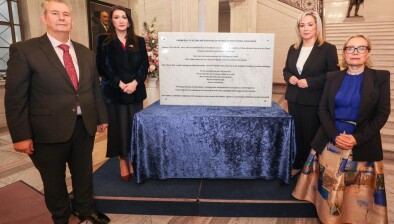NI: NI Court of Appeal: Driver refused leave to appeal conviction after victim claimed paralysis was caused by medical negligence
A man given a suspended sentence after pleading guilty to one count of causing grievous bodily harm by driving a motor car without due care and attention has had his application for leave to appeal refused by the Court of Appeal, after it was found the injuries other than the paralysis amounted to ‘grievous bodily injury’ in any event.

About this case:
- Judgment:
The application arose in circumstances where medical reports about the motorcyclist who was injured, stated that he was ‘potentially… neurologically intact at the time of injury’ and that he ‘underwent a significant neurological injury during surgery’ at the Royal Victoria Hospital.
Background
Mr Lukasz Okrasa, a resident of the Republic of Ireland, was on holiday in Northern Ireland in September 2014, when he was involved in a road traffic accident with a motorcyclist on the Whitepark Road, Ballycastle Co Antrim.
The Court heard that Mr Okrasa was driving his car on the Whitepark Road when he noticed a sign to a view point for the Carrick-a-Rede rope bridge – since it was too late to turn into the road for the viewpoint, Mr Okrasa drove on until he reached a layby on his own side and pulled in.
In the process of making a 5mph U-turn on a bend which only had visibility of ‘about 77 yards’, a motorcyclist came around the bend and collided heavily with the off-side of Mr Okrasa’s car.
Paralysis
The motorcyclist sustained extensive injuries, including:
Significantly, the motorcyclist also suffered ‘complete spinal cord injury from T4 level mid-chest’, resulting in ‘paralysis of the muscles of the lower and mid-chest, abdomen, pelvis and lower limbs’ requiring him to remain wheelchair dependent for life.
Mr Okrasa pleaded guilty on the day of his trial, and in September 2016, the was sentenced to one year’s imprisonment suspended for 3 years, a fine of £500, and was disqualified from driving for one year.
Amended Statement of Claim
In December 2015, an amended Statement of Claim was submitted by the motorcyclist – and medical reports had been prepared by Mr Paul Nolan, Consultant Trauma and Orthopaedic Spinal Surgeon, had been prepared at the request of the applicant’s civil claim solicitors.
In his first report, dated 30 August 2015, Mr Nolan concluded that the motorcyclist’s treatment at the Royal Victoria Hospital was ‘sub-optimal’ and that ‘he may well have been neurologically intact prior to his surgery and has undergone a catastrophic neurological injury during his operative procedure’.
In October 2015, Mr Nolan gave a further opinion which stated that the motorcyclist ‘was neurologically intact on arrival in the Royal Victoria Hospital’ and that significant injury to the spinal cord was caused by his thoracic pedicle screws being ‘sub-optimally positioned’ and ‘placed in the spinal canal’.
Accepting that ‘15-20 per cent of pedicle screws may be misplaced’, Mr Nolan concluded that the motorcyclist’s care was a ‘below a standard that one would normally expect’.
Application for Leave to Appeal
It was submitted on behalf of Mr Okrasa that when he entered his guilty plea, he did so in the belief that the motorcyclist’s permanent paralysis had been caused in the accident; and that the prosecution’s failure to mention that the paralysis was due to the operation and not the collision was ‘singularly misleading’.
It was contended that if the information was known in advance of the plea, Mr Okrasa would have been able to make ‘a properly informed decision as to the risk of inviting the jury to consider the issue of whether his driving was careless, in the knowledge that the consequences of his driving could not be shown to be anywhere near as catastrophic …’
Further, had the prosecution known the true position it might not have proceeded with the prosecution since the injuries ‘while technically amounting to GBI’, were ‘neither life-threatening nor life-changing in the longer term’.
In considering the safety of the guilty plea, Lord Justice Weir was satisfied that the ‘admission of fresh evidence which undermines the safety of the plea of guilty may lead to the conviction being quashed’ as per R v Swain Crim LR 480.
However, in deciding whether to admit the evidence under section 25(2) of the Criminal Appeal (Northern Ireland) Act 1980, the Court ‘must also consider whether it appears that the evidence may afford any ground for allowing the appeal’.
Accordingly, the Court determined to receive the material de bene esse, deferring aa decision on whether to admit it pending argument as to its effect upon the safety of the conviction.
Novus actus interveniens
On behalf of the prosecution, attention was drawn to ‘very high two-part hurdle that is required to be surmounted before incorrect medical treatment can be held to constitute a novus actus interveniens’ as per R v Smith 2 QB 35 and R v Malcherek, R v Steel 2 All E R 422
Considering the reports of Mr Nolan, the Court held that admitting this as new evidence would not afford any ground for allowing the appeal since ‘what happened in this necessary operation, when performed to a sub-optimal standard, was quite foreseeable’.
The Court also found that the injuries other than the paralysis undoubtedly constituted ‘grievous bodily injury’ and that the sentence was neither wrong in principle nor excessive; and that Mr Okrasa’s driving was careless.










